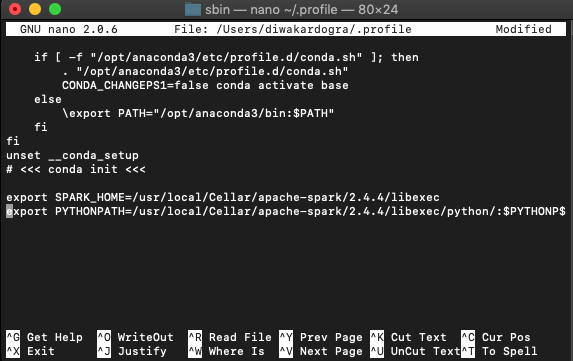

- BREW INSTALL APACHE SPARK 2.1 HOW TO
- BREW INSTALL APACHE SPARK 2.1 SOFTWARE
- BREW INSTALL APACHE SPARK 2.1 CODE
- BREW INSTALL APACHE SPARK 2.1 DOWNLOAD
Up until around October 2014, Homebrew had a brew versions command that would list all the versions of a package, and the corresponding Git commands to roll the formula back.

BREW INSTALL APACHE SPARK 2.1 HOW TO
The homebrew formulae (that tells the brew command how to build each package) are all stored in a Git repository.Īll we need to do is to roll back the formula for the package we want to build to the latest commit that was active for that package.

In my case, the version I'm looking for (version 1.2.1) isn't available as a tap, so I need an alternative approach. You can install one of them like this: $ brew install homebrew/versions/elasticsearch11 The first line of output refers to the default package, while the following line refers to the "tapped" versions that are also available. Homebrew/versions/elasticsearch-0.20 homebrew/versions/elasticsearch090 homebrew/versions/elasticsearch11 Old versions are maintained in the homebrew-versions repository, and show up in the output of homebrew search: $ brew search elasticsearch If a lot of people might need to use an old version of a package (or "formula", in homebrew's terminology), it might have been made available as a tap. It's useful to be able to install a specific version.
BREW INSTALL APACHE SPARK 2.1 SOFTWARE
Packages in homebrew are typically updated to provide the latest version of an app, which means that you can find yourself running more recent versions of your software in development, than in production. I develop Agile Planner on a Mac, and install software required by my app (such as PostgreSQL, memcached and Elasticsearch) using the homebrew package manager. This is often the case when hosting apps on a PaaS (Platform as a Service) provider such as Heroku.
BREW INSTALL APACHE SPARK 2.1 CODE
My preferred approach is to develop my code in a virtual machine containing the same operating system and software as my production server environment, but sometimes we don't have much control over the code we run on the server. When developing for the web, I like to make sure that the software I'm using in development is a close match for the code that I'm running on my live servers. Result result = client.Installing a specific version of a homebrew package Producer Client client ( "pulsar://localhost:6650") << " with payload '" << msg.getDataAsString() << "'") LOG_ERROR( "Failed to subscribe: " << result) Result result = client.subscribe( "my-topic", "my-subscribtion-name", consumer) If you’re using TLS authentication, the URL will look like something like this: pulsar+ssl://:6651Ĭonsumer Client client ( "pulsar://localhost:6650") Here’s an example for localhost: pulsar://localhost:6650Ī URL for a production Pulsar cluster may look something like this: pulsar://:6650 Pulsar protocol URLs are assigned to specific clusters, use the pulsar URI scheme and have a default port of 6650. To connect to Pulsar using client libraries, you need to specify a Pulsar protocol URL. This will install the package with the library and headers. If using Python 3 on MacOS, add the flag -with-python3 to the above command. Use the Homebrew supplied recipe to build the Pulsar To build Debian packages: pulsar-client-cpp/pkg/deb/docker-build-deb.shĭebian packages will be created at pulsar-client-cpp/pkg/deb/BUILD/DEB/ Package name Static library libpulsar.a and C++ and C headers In pulsar-client-cpp/pkg/rpm/RPMS/x86_64/. This will build the RPM inside a Docker container and it will leave the RPMs RPM pulsar-client-cpp/pkg/rpm/docker-build-rpm.sh To build the C++ library packages, first build the Java packages: mvn install -DskipTests Statically linked libpulsar.so / libpulsar.a with all the required There are recipes that build RPM and Debian packages containing a All the instructions are run at the root directory of your cloned Pulsar If you want to build RPM and Debian packages off latest master, you can follow the instructionsīelow to do so.
BREW INSTALL APACHE SPARK 2.1 DOWNLOAD
To install a DEB package, download the DEB packages and install them using the following command: $ apt-install apache-pulsar-client*.deb To install a RPM package, download the RPM packages and install them using the following command: $ rpm -ivh apache-pulsar-client*.rpm You can choose to downloadĪnd install those packages instead of building them yourself. Since the 2.1.0 release, Pulsar ships pre-built RPM and Debian packages. The Pulsar C++ client has been successfully tested on MacOS and Linux.


 0 kommentar(er)
0 kommentar(er)
